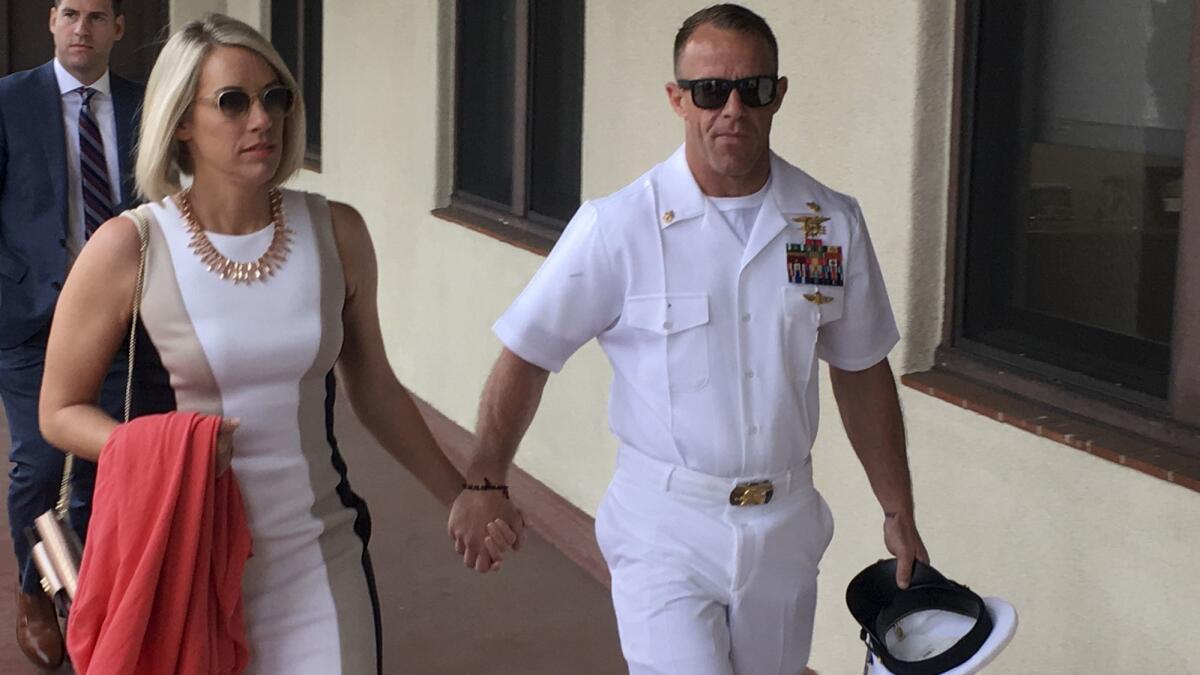Navy SEAL called dead prisoner an ‘ISIS dirtbag,’ witness testifies
- Share via
Reporting from san diego — A Navy SEAL charged with killing a captive teenage militant in his care had told fellow troops that if they encountered a wounded enemy, he wanted medics to know how “to nurse him to death,” a former comrade testified Wednesday.
When a radio call announced an Islamic State prisoner was wounded on May 3, 2017, Special Operations Chief Edward Gallagher replied: “Don’t touch him, he’s all mine,” Dylan Dille told jurors in a military courtroom.
When Iraqi forces delivered the captive to a SEAL compound in Mosul, he was on the hood of a Humvee and fading in and out of consciousness with only a minor leg wound visible.
Dille said he was not the grizzled warrior he expected.
“He looked about 12 years old,” Dille said. “He had a wrist watch around his bicep. He was rail thin.”
Gallagher is charged with murder after prosecutors say he treated the boy’s wounds and then stabbed him in the neck.
He has pleaded not guilty to murder, attempted murder and other charges that could carry up to life in prison.
Gallagher’s lawyers say that he only provided medical care to the prisoner and that disgruntled SEALs made up the allegations because they didn’t like his demanding leadership.
Dille did not see what happened to the boy, who he acknowledged may have been as old as 15.
But after returning to the house where they were staying, Dille said Gallagher confronted him and other senior enlisted men and said he knew they were upset with what happened.
“This was just an ISIS dirtbag,” Dille said Gallagher told the group.

Gallagher said the next time he did something similar, it would be out of their sight, Dille said.
The testimony came on the second day of Gallagher’s court-martial in a case that has drawn the attention of President Trump and revealed a rare break in secrecy from those in the elite special forces.
Defense lawyer Tim Parlatore questioned Dille about why he never confronted Gallagher or reported him to superiors until a year after they returned from deployment.
Dille said the allegations were serious and he wanted to “be prepared for the angry mob to come knocking,” referring to conservative news media and older SEALs who maintain their silence.
Parlatore accused Dille of using a group text to coordinate other troops to report Gallagher to superiors. He asked Dille if he was concerned other SEALs would change their stories.
“My truth is watertight, Mr. Parlatore,” Dille said.
Dille also said that he believed Gallagher had fired at Iraqi civilians from a sniper’s position several times, including an instance on Father’s Day 2017 when an old man was shot by the Tigris River.
Dille was also a sniper and was near Gallagher during the shootings but didn’t see him pull the trigger.
After hearing a gunshot coming from Gallagher’s position and seeing the old man fall, Dille said he looked through his scope and saw the man bleeding through his white clothing. He said Gallagher then radioed that he thought he had missed the old man.
Defense lawyer Marc Mukasey objected to the testimony, saying descriptions of the alleged shootings were “wildly vague.”
The judge allowed most of the testimony from Dille, who was a first class special warfare operator before he left the Navy last year.
Gallagher, who served eight tours of duty and earned two Bronze Stars for valor, was in the courtroom in his dress whites. His wife and parents also attended.
His family has lobbied intensely for his freedom, claiming he was being treated unfairly.
Congressional Republicans took up his cause and prevailed on Trump to release Gallagher from the brig into better conditions in a military hospital. Trump also is reportedly considering a pardon for Gallagher, along with other service members accused of war crimes.
A judge released Gallagher from custody last month after prosecutors violated his constitutional rights by tracking defense attorney emails in an effort to find who leaked court documents to a Navy Times reporter.
More to Read
Sign up for Essential California
The most important California stories and recommendations in your inbox every morning.
You may occasionally receive promotional content from the Los Angeles Times.










